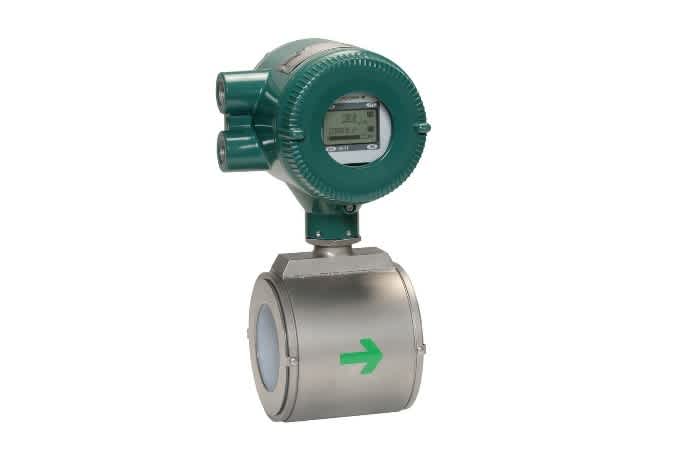Advanced magnetic flow meter design provides best-in-class performance.
 Although chemical feed is among the more common process applications, it still requires very accurate and stable flow measurements to optimize process control and plant operations performance.
Although chemical feed is among the more common process applications, it still requires very accurate and stable flow measurements to optimize process control and plant operations performance.
Mixing chemicals in the main process brings sudden changes to conductivity and a non-uniform distribution signal. The measurement stability under the changing fluid conditions is a very important factor and must be applied accurately in the control loop. Traditionally, a 4-wire magnetic flowmeter is used for flow measurement, but the power consumption to help maintain the signal-to-noise ratio can be costly throughout the lifecycle.
Challenges
Noise is a challenge when it comes to maintaining an accurate and stable measurement. Introducing chemical dosing into a process often generates turbulent flow that is related to the rough surface of the lining inside the magnetic flowmeter. The electrodes in the meter pick up the stronger noise component.
Other issues are related to the signal-to-noise ratio. This depends on the coil windings of the excitation circuit and the measuring signal that the flow meter is capable of sensing. Most magnetic flow meters on the market offer a selection only between low or high-frequency methods, which improves the signal relative to the noise but compromises zero stability.
Solution
 Yokogawa’s solution, the ADMAG AXR series, delivers the dual benefits of high performance comparable to a 4-wire system at the lower cost of a 2-wire system across a variety of applications.
Yokogawa’s solution, the ADMAG AXR series, delivers the dual benefits of high performance comparable to a 4-wire system at the lower cost of a 2-wire system across a variety of applications.
The ADMAG AXR employs the patented “Dual Frequency Excitation Method.” This unique technology combines the best properties of low-frequency excitation to enable a stable measurement and high-frequency excitation to deliver excellent noise immunity.
As a result, the AXR can suppress process-generated noise to secure zero stability without sacrificing fast response time. Additionally, the AXR achieves the same level of noise immunity as a 4-wire circuit under varying fluid conditions, delivering the performance necessary to meet the requirements for control loop applications. To resolve additional noise issues, Yokogawa’s aligned, “super high density” coil winding technique maximizes the signal-to-noise ratio.
This technology increases the number of coil turns by 1.5x compared to 4-wire mag meters, resulting in an improved signal vs. noise. Finally, a mirror-finished lining option is available to ensure a smooth surface that minimizes flow noise by reducing turbulence.
The ADMAG AXR 2-wire magnetic flowmeter can be installed in a 2-wire system without an AC power source, thus drastically reducing the initial instrumentation cost and power consumption. The power consumption of the 2-wire meter is only 1%—4% of a 4-wire meter. Decreased by more than 96%, the power consumption contributes significantly to lifetime energy savings, reduced operations costs, and an overall reduction of the plant’s carbon footprint.
Key Benefits
- Reduced power consumption of AXR decreases lifecycle costs and carbon footprint.
- Increased signal-to-noise ratio with super-high-density coils and mirror-finished lining provide higher measurement accuracy for improved process control and product quality.
- Unique Yokogawa dual-frequency design provides best-in-class performance.
Industries
-
Chemical
Chemical plants rely on continuous and batch production processes, each posing different requirements for a control system. A continuous process calls for a robust and stable control system that will not fail and cause the shutdown of a production line, whereas the emphasis with a batch process is on having a control system that allows great flexibility in making adjustments to formulas, procedures, and the like. Both kinds of systems need to be managed in available quality history of product, and to be able to execute non-routine operations. With its extensive product portfolio, experienced systems engineers, and global sales and service network, Yokogawa has a solution for every plant process.
-
Drinking Water Treatment
The goal of drinking water treatment is to produce clean, safe, and potable water that meets regulatory standards and is suitable for drinking and other domestic uses.
-
Wastewater Treatment
The goal of waste water treatment is to produce treated water that meets environmental regulations and can be safely released into bodies of water or reused for purposes like irrigation or industrial processes.
-
Water & Wastewater
All water, regardless of its source, has value. However, with water resources being finite, a focus on "One Water" is necessary to maximize every drop within the water system, ensuring a stable supply of clean and safe water. As we consider current and future needs, planning and implementation are critical for long-term resilience and reliability, meeting both community and ecosystem demands. Yokogawa believes water is a human right for all. Thus, contributing to a sustainable water cycle is one of our Sustainable Development Goals (SDGs).
Related Products & Solutions
-
ADMAG AXR
Two-wire Magnetic Flow Meter
-
Magnetic Flow Meters
Achieve stable measurement and quick response times.
Have Questions?
Contact a Yokogawa Expert to learn how we can help you solve your challenges.